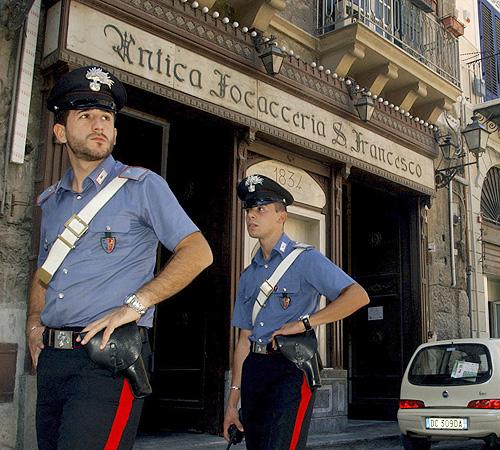Sicilian shops go against Mafia

Police guard the Antica Focacceria San Francesco sandwich restaurant in downtown Palermo, Sicily, southern Italy, in this Oct. 5 photo. In a rebellion shaking the Sicilian Mafia to its centuries-old roots, businesses in growing numbers are refusing to sub Alessandro Fucarini, The Associated Press
Jan 14, 2008
Last updated on May 12, 2016 at 07:55 p.m.
PALERMO, Sicily – When it came down to business, Cosa Nostra could always count on fear.
No more.
In a rebellion shaking the Sicilian Mafia to its centuries-old roots, businesses are joining forces in refusing to submit to demands for protection money called “pizzo.”
And they’re getting away with it, threatening to sap an already weakened crime syndicate of one of its steadiest sources of revenue.
Get The Daily Illini in your inbox!
The Mafia has a history of bouncing back from defeat, but this time it is up against something entirely new: a Web site where businessmen are finding safety in numbers to say no to the mob.
At the same time, businessmen ranging from neighborhood shopkeepers to industrialists are being emboldened by arrests of fugitive bosses, and the discovery in raids of meticulous Mafia bookkeeping on who paid the “pizzo” and how much.
“This rebellion goes to the heart of the Mafia,” said Palermo prosecutor Maurizio De Lucia, who has investigated extortion cases for years. “If it works, we will have a great advantage in the fight against the Mafia.”
These latest gains build on other successes in the fight to break Cosa Nostra’s stranglehold on Sicily. In the last two decades, the syndicate has been battered by testimony from turncoats, who helped send hundreds of mobsters to prison in the late 1980s, and a fierce state crackdown a decade later after bombs killed two Palermo anti-Mafia prosecutors.
The number of rebels on the Web site is still tiny compared to Palermo’s businesses overall, but their movement has helped to chip away at the Mafia’s psychological hold on Sicilians – long conditioned to believe that defiance would bring ruin or a death sentence. And any consistent crumbling of that culture of fear could ultimately lead to Cosa Nostra’s undoing.
The businesses are openly defying the Mafia by signing on to a Web site called “Addiopizzo” (Goodbye Pizzo), which brings together businesses in the Sicilian capital that are resisting extortion.
The campaign was launched in 2004 by a group of youths thinking of opening a pub. They started off by plastering Palermo with anti-pizzo fliers, reading “An ENTIRE PEOPLE WHO PAYS THE PIZZO IS A PEOPLE WITHOUT DIGNITY,” and eventually brought their campaign online where it struck a profound chord with Sicilians fed up with Mafia bullying.
Confindustria, the industrialists’ lobby, has also boosted the movement with a threat to expel members who pay protection money. Its Sicilian branch has gone through a list of pizzo-paying companies found in a raid on a top Mafia boss’ hideout, and this month began summoning heads of those companies to demand to know if they indeed had been paying and should be drummed out of the politically influential lobby.
In one case, the director of a private clinic said her institution wound up on Cosa Nostra’s list because a mobster was treated there, although it apparently was unclear during his hospitalization that he was a Mafioso.
At the same time, authorities are ratcheting up the pressure on business owners, aggressively prosecuting those who refuse to testify against the Mafia in clear-cut cases of extortion. Under Italian law, a businessman who denies paying up despite flagrant evidence – such as being caught on a surveillance tape – can be charged with “aiding and abetting” Cosa Nostra.
“Now it is a bigger risk for us to pay than not to pay,” said Ugo Argiroffi, an engineer who recently added his Palermo construction company, C.O.C.I. to Addiopizzo’s list (www.addiopizzo.org in Italian with an English link).
While the nearly 230 businesses on the list are only a fraction of Palermo’s thousands of stores, offices and factories, a similar group has sprouted up in Catania, Sicily’s second-largest city.
Perhaps most significant, the rebellion has taken root in strongholds of the most ruthless Mafia clans – places such as Gela, a drab, industrial coastal town. Some 80 Gela businessmen in recent months have denounced extortion attempts.
It is a dramatic turn since the early ’90s, when a Gela merchant who denaounced extortion was slain by the Mafia, and a Gela car dealer, whose showroom was repeatedly torched, had to move his family and change his name after he testified in court.
In another prominent case, Libero Grassi, who had a Palermo clothing business, was gunned down by the Mafia in 1991 after he made a futile public plea for other merchants to join him in denouncing extortion.
Prosecutors trace the extortion rebellion back to the scramble for power after Bernardo Provenzano, the alleged “boss of bosses,” was captured last year near his hometown of Corleone.





